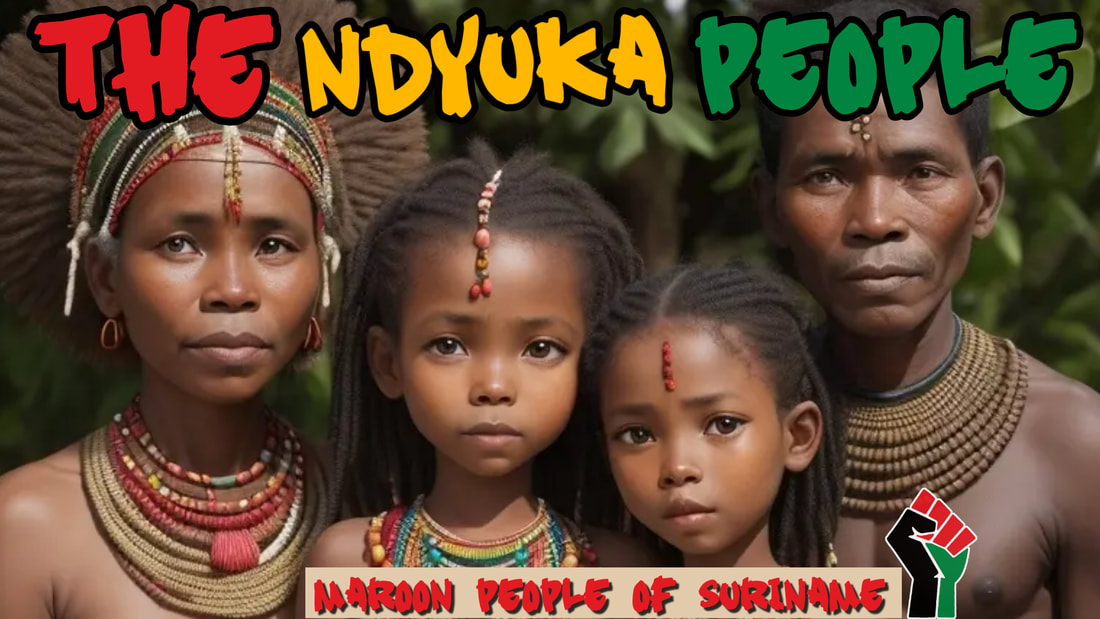|
The Ndyuka people, also known as the Aukan or Okanisi, are one of the six Maroon tribes in Suriname and French Guiana in South America. Their rich history and culture are deeply rooted in their fight for freedom, unique traditions, and vibrant societal structures. The history of the Ndyuka people dates back to the 17th and 18th centuries when their ancestors, who were enslaved Africans brought to Suriname by the Dutch, escaped from the plantations. They fled into the Surinamese interior and French Guiana, seeking freedom from the harsh conditions of slavery, and established their own communities along the rivers, particularly along the various rivers and its tributaries in the dense rainforests of Suriname and French Guiana. The Tapanahony River in Suriname divides the Opu group of the Ndyuka upstream and the Bilo group of the Nyduka downstream. The Ndyuka warriors and maroon leaders of the time became a symbol of resistance and leadership, these escapees formed autonomous settlements. Their fight against the Dutch colonial forces was characterized by fierce resistance and strategic warfare, often resulting in the signing of peace treaties. One of the most notable agreements was the 1760 peace treaty, signed with the Dutch, which recognized the independence of the Maroon communities. The Ndyuka people speak a language called Ndyuka, which is a creole language heavily influenced by West African languages, English, and Dutch. Over time, it has evolved into a distinct language, serving as a marker of their cultural identity. The Ndyuka people speak three dialects: proper Ndyuka, Aluku, and Paramaccan. Their society is structured around matrilineal lines, with the family as the focal point. Each village is governed by a gaanman (chief) and supported by a group of elders who make decisions in consensus with the village council. Following the chief there are captains, ancestral spirits, and lastly the priest. The social fabric is tightly woven, emphasizing communal living and a strong sense of unity among its members. Ndyuka tribes are known to have conflicts with each other. The Ndyuka people have preserved elements of their African heritage, including their spiritual beliefs and rituals. They believe in ancestral worship and the presence of various spirits in nature. Traditional ceremonies, music, and dances are used to honor their ancestors and seek guidance from the spiritual realm. Artistic expressions play a significant role in Ndyuka culture. Intricate wood carvings, woven baskets, and vibrant textiles are crafted, often with symbolic meanings. Music and dance, accompanied by drums and other traditional instruments, are central to their ceremonies and celebrations, representing their stories, struggles, and triumphs. The men typically make wood carvings with bright and elaborate colors, the women create art from calabash and also sew and stitch designs for their family. Their cuisine is a fusion of African, Amerindian, and European influences. Staples like rice, cassava, plantains, and various stews are commonly found. Flavors are enriched by the use of local herbs and spices, creating a unique culinary experience. While the Ndyuka people have managed to maintain their cultural identity, they face challenges in preserving their traditions. Modernization, globalization, and the encroachment of the outside world pose threats to their cultural heritage. Efforts to sustain their unique way of life involve a delicate balance between adaptation and preservation. The history and culture of the Ndyuka people display their journey from enslavement to freedom, and the preservation of their distinct cultural practices is a symbol of human endurance and triumph. Efforts to sustain their customs and traditions are crucial for ensuring the continued flourishing of these incredible people. The Ndyuka people's history and culture continue to captivate scholars, cultural enthusiasts, and those seeking to understand and celebrate the diversity and resilience of human societies.
0 Comments
Leave a Reply. |
Details
Categories
All
Click Here to join our mailing list
|
Contact Us: |
Connect With Us |
Site powered by PIT Web Design


 RSS Feed
RSS Feed



